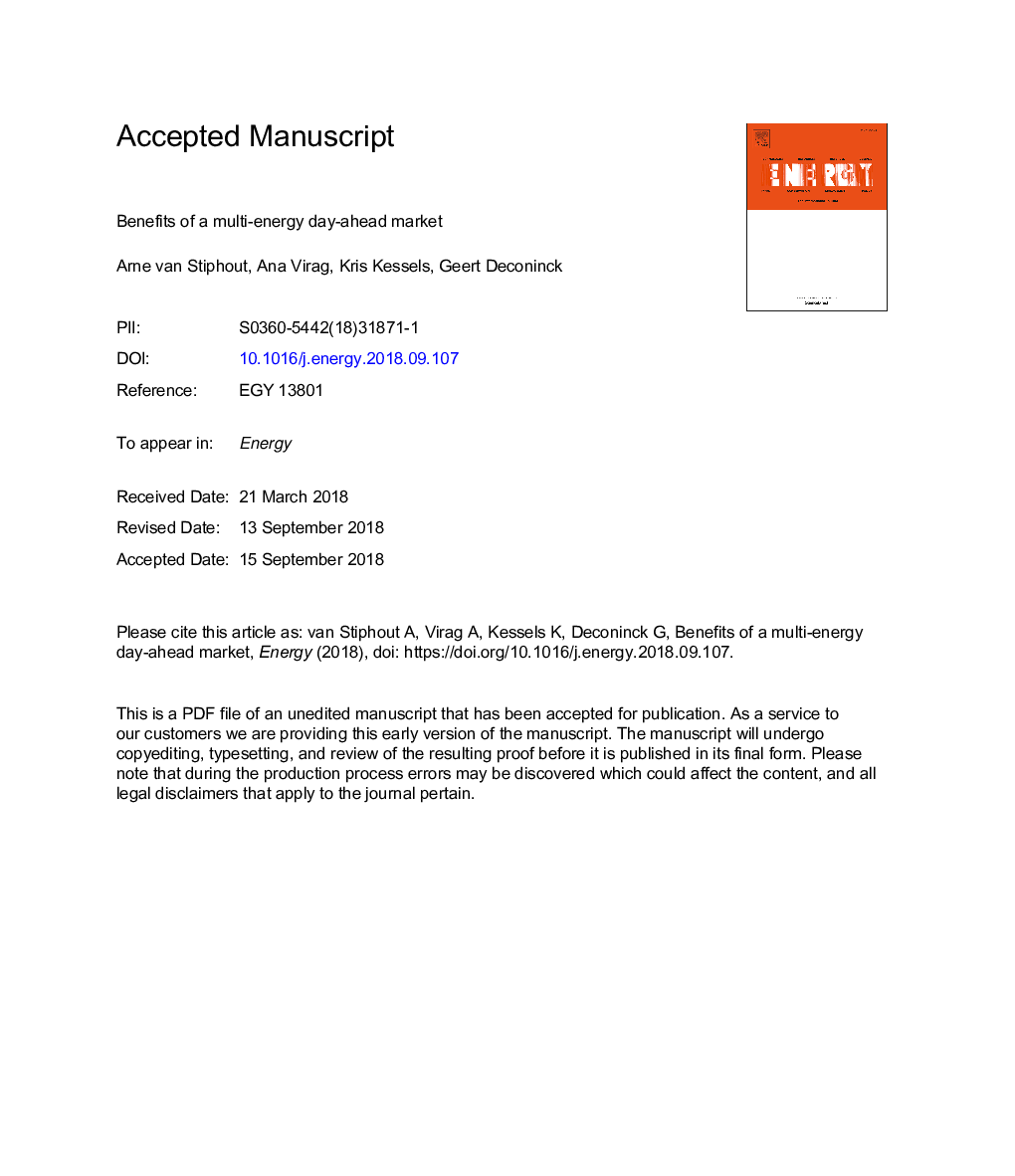| کد مقاله | کد نشریه | سال انتشار | مقاله انگلیسی | نسخه تمام متن |
|---|---|---|---|---|
| 11015679 | 1782157 | 2018 | 22 صفحه PDF | دانلود رایگان |
عنوان انگلیسی مقاله ISI
Benefits of a multi-energy day-ahead market
ترجمه فارسی عنوان
مزایای یک بازار انرژی چند روزه
دانلود مقاله + سفارش ترجمه
دانلود مقاله ISI انگلیسی
رایگان برای ایرانیان
کلمات کلیدی
انرژی تجدید پذیر، انعطاف پذیری، برنامه ریزی نیروی برق، کار سیستم برق، ذخیره سازی برق،
ترجمه چکیده
یکپارچگی سیستم انرژی می تواند مزایای متعددی را برای سیستم های انرژی، به خصوص کسانی که در حال گذار به سهام بالا انرژی تجدید پذیر هستند، به ارمغان بیاورد. استراتژی ها برای تحقق بخشیدن به مزایای تئوری این رویکرد در عمل ضروری هستند. بنابراین، این مقاله پیشنهاد سازماندهی و فرمول بندی ریاضی یک بازار چند روزه را که در آن برق، گاز و گرما به طور همزمان معامله می شود، ارائه می دهد. این راه اندازی بازار به یک مورد آزمون مفهومی اعمال می شود تا مشخص شود که چگونه در مقایسه با تنظیم مرجع تقلید از عمل جاری، بازار چند حامل می تواند مزایای یکپارچگی سیستم های انرژی را باز کند. به طور کمی نشان داده شده است که بازار چند حامل (1) نیاز به پیش بینی قیمت ها در بازارهای بعدی و پیامدهای خطاهای مرتبط را حذف می کند (2) اجازه استفاده از انعطاف پذیری موجود در یک حامل را برای تسهیل متعادل سازی در دیگر، به عنوان مثال با استفاده از انعطاف پذیری یک سیستم گرمایشی برای کمک به تعادل سیستم برق، و (3) امکان نتایج خاص بازار را که قابل دستیابی در یک ترتیب پیوسته است، که بهینه سازی نتایج بازار را افزایش می دهد.
موضوعات مرتبط
مهندسی و علوم پایه
مهندسی انرژی
انرژی (عمومی)
چکیده انگلیسی
Energy system integration can bring several benefits to energy systems, notably to those that are in transition to high shares of renewable energy. Strategies are needed to realize the theoretical benefits of this approach in practice. Therefore, this paper proposes the organization and mathematical formulation of a multi-carrier day-ahead market in which electricity, gas and heat are traded simultaneously. This market set-up is applied to a conceptual test case to identify how - compared to a reference set-up mimicking the current practice - the multi-carrier market is able to unlock the benefits of energy system integration. It is quantitatively shown that the multi-carrier market (1) eliminates the need for forecasts of prices on subsequent markets and the consequences of the related errors, (2) allows to use the flexibility available in one carrier to facilitate the balancing in another, e.g. using the flexibility of a heat system to help balance the electricity system, and (3) enables specific market outcomes, unachievable in a sequential set-up, which increase the optimality of the market outcome.
ناشر
Database: Elsevier - ScienceDirect (ساینس دایرکت)
Journal: Energy - Volume 165, Part B, 15 December 2018, Pages 651-661
Journal: Energy - Volume 165, Part B, 15 December 2018, Pages 651-661
نویسندگان
Arne van Stiphout, Ana Virag, Kris Kessels, Geert Deconinck,
